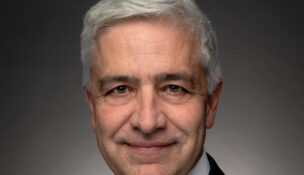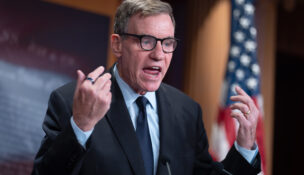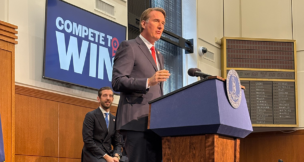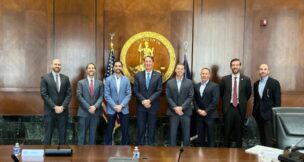State GOP seeks dismissal of Chase lawsuit
Hearing scheduled Friday over party's plans to hold May nominating convention
Kate Andrews //February 18, 2021//
State GOP seeks dismissal of Chase lawsuit
Hearing scheduled Friday over party's plans to hold May nominating convention
Kate Andrews //February 18, 2021//
The Republican Party of Virginia is asking the Richmond Circuit Court to toss out a lawsuit by state Sen. Amanda Chase, R-Chesterfield, that seeks to force the party to hold a primary election instead of a nominating convention.
In papers filed this week by Washington, D.C., attorney Lee Goodman, the Republican Party of Virginia filed a motion to be heard before a scheduled hearing for Chase’s motion for an emergency temporary injunction against the state GOP. If granted, Chase’s injunction would prevent the state party from moving forward with plans for its May 1 convention to nominate GOP 2021 candidates for governor, attorney general and lieutenant governor.
Both the Republican and Democratic parties are required to register plans for a primary election with the State Board of Elections by Tuesday, Feb. 23.
A hearing is scheduled at Richmond Circuit Court on Friday, although the courts were closed Thursday due to winter weather and could also close Friday.
Virginia Democrats plan to hold a statewide primary in June allowing voters to choose nominees, but Republicans are planning to host an “unassembled” convention to choose its 2021 state candidates — a pandemic-era version of a nominating convention, which is ordinarily held in a building with thousands of delegates. The party hosted so-called “drive-through” conventions last year to choose its nominees for Congress.
Chase, a gubernatorial candidate, has vocally opposed holding a convention instead of a primary.
Chase’s suit requests that the Richmond Circuit Court declare that the party is allowed only to hold an in-person convention — leading to the inevitable decision that such a gathering would be illegal under Gov. Ralph Northam’s Executive Order 72 to prevent the spread of the pandemic.
Chase argues that because gatherings of more than 10 people have been outlawed by executive order to prevent the spread of coronavirus, the state GOP “has chosen a method that is illegal under the governor’s current executive orders and is secretly planning to choose the statewide nominees themselves, bypassing the people of Virginia. I will not stand for this.” She said also that the state party’s plans amount to “socialism,” by allowing only a few people in power to decide on candidates.
The GOP’s State Central Committee ended a meeting in January before holding a vote to choose a primary election, and it is not scheduled to hold another meeting until after the Feb. 23 state elections board deadline.
Goodman, a former chairman and commissioner of the Federal Election Commission and the Republican Party of Virginia’s general counsel from 2009 to 2013, argues in his motion that Chase’s suit has no merit because the party has not fixed its nomination method, and that Chase “has no right to a state-run primary. The party has a well-established First Amendment right to reject a state-run primary.”
Goodman also says that it’s uncertain that Gov. Ralph Northam will continue to restrict gatherings, and that Chase “wants to influence ongoing deliberations within the party rather than to enjoin the actual nominating method the party will employ in the spring.”
In another motion opposing Chase’s injunction, Goodman says Chase is “not harmed by being required to compete for the nomination in the method chosen by her party. Moreover, the ulterior relief she seeks — a state-run, taxpayer-funded primary — is not relief this court can mandate upon the party.”
Chase vocally opposes a convention and flirted in December with running for governor as an independent — in part, she argued, because GOP officials could cut her out of the nomination over personal dislike. A self-described “Trump in heels,” Chase has long had disagreements with her party. In 2019, she left the Senate Republican Caucus over its more moderate stances on Medicaid and tax increases, and she was kicked out of the Chesterfield County GOP after making public statements against the Republican county sheriff.
In late January, Chase was censured by the Virginia Senate for “failure to uphold her oath of office, misuse of office and conduct unbecoming of a senator” based on several controversies over the past two years, including participation in the Jan. 6 pro-Trump rally Jan. 6 at the National Mall that preceded the insurrection at the U.S. Capitol. She is the first Virginia senator censured since 1987, with a vote that included three Republican senators supporting her censure. Chase has sued the state Senate in response, claiming the censure is a violation of her civil rights to free speech.
The first declared GOP candidate for governor, Chase has raised more money than her competitors, who all joined the race after the November 2020 election, and according to recent polls, is the GOP frontrunner in the crowded race. Other vying for this year’s Virginia GOP gubernatorial nomination include state Del. Kirk Cox, former Carlyle Group CEO Glenn A. Youngkin, former New Media Strategies CEO Pete Snyder and retired Army Col. Sergio de la Peña. Youngkin and Snyder, however, are multimillionaires who could potentially self-fund their campaigns.
Youngkin said in a radio interview that he is “extraordinarily frustrated” by the State Central Committee’s decision not to hold a vote at its January meeting to reconsider the unassembled convention method but that he aims to win a primary or convention, whichever is held. “If we’re going to have a primary, let’s go have a primary,” he said. “I am so happy to run for governor no matter what state central decides. But this idea that we’re not going to decide is just unacceptable. … Let Republicans in Virginia choose. If we choose a convention, which is great with me, I plan on winning that because we need to choose a governor who can win.”
Similarly, Cox’s campaign said the delegate hopes “that the State Central Committee will take care of its business, hopefully sooner rather than later, but that isn’t stopping us from doing everything it will take to win no matter the nomination.”
De la Peña’s campaign says the former Trump appointee to the Department of Defense “has no opinion on a convention or primary.” Snyder’s campaign did not respond to a request for comment.


















